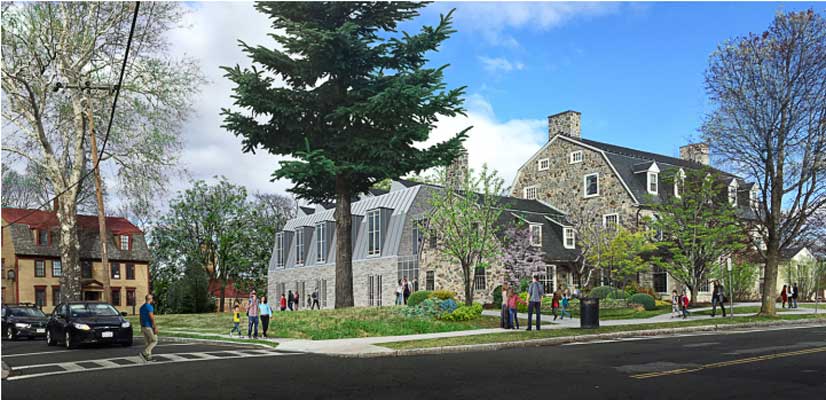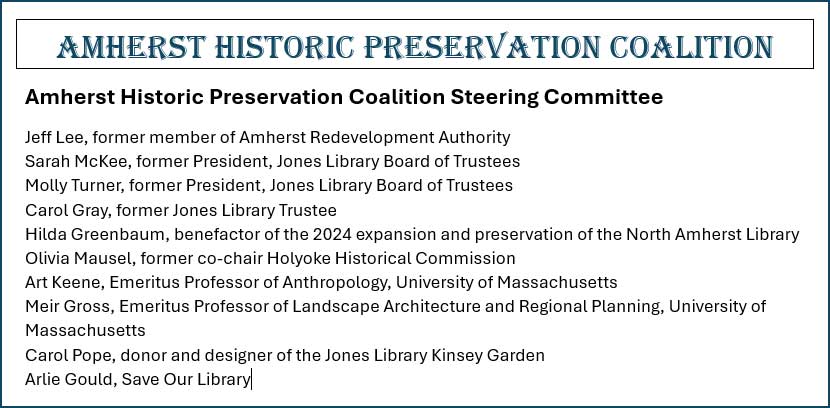Jones Library Building Project Odyssey Approaches Final Challenges

Contention, Rising Costs, and Eliminated Features Have Marked Renovation-Expansion Plan
For ten years the proposed $50 million Jones Library Demolition-Renovation-Expansion has dodged obstacles and averted cancellation. It has survived a voter veto petition, litigation over improper invalidation of petition signatures, COVID-19 cost escalation, fundraising shortfalls, the trustee treasurer advising against continuing the project, a Town Council vote to approve an additional $10 million in borrowing, loss of $2 million in Historic Tax Credits, complaints over inaccurate accounting and suppressed documents, and rejection of a lone construction bid that was $6.5 million over budget.
Yet, aided by a well-connected private Capital Campaign, a never-say-die board of trustees and library director, politically aligned town leaders, and a well-heeled and determined Massachusetts Board of Library Commissioners (MBLC), the battered project staggers on.
Two major hurdles remain.
First, because the project has been awarded grants of $15.6 from the state and $2.1 million from the federal government, it is legally required to undergo public reviews of adverse effects to the environment and historic properties. A quirk of the review process has resulted in the Town of Amherst being delegated to be the entity responsible for conducting the mandatory reviews on behalf of Massachusetts and the two federal agencies administering the federal grants, NEH and HUD.
Second, the project must attract a general contractor bid that is $6.5 million lower than the single bid received in May, or gain approval from the Town Council for additional borrowing. A December 2023 analysis estimated that $25 million in local tax money would be needed to complete the project.
See related Council Approves Costliest Library Project in Massachusetts
Hopes Pinned on a Successful Re-bid
Over recent weeks the Jones Library trustees have committed $550,700 from their endowment to hire Finegold Alexander Architects (FAA) to “value engineer” the proposed design to make it less expensive and more attractive to bidders. FAA proposed a set of 16 feature reductions aimed at shaving $2.9 million from the estimated construction cost.
Two of the reductions – replacing the slate roof with asphalt shingles and repairing rather than replacing original windows with energy efficient sashes – were disallowed by the Amherst Historical Commission, reducing value engineering savings by $300,000.
FAA also proposed discarding Philippine Mahogany millwork in the 1928 building to save $1 million. However, after community pushback, Trustee President Austin Sarat and Library Director Sharon Sharry decided to back off from this change. They authorized FAA to pivot to cutting into millwork where wiring and plumbing systems need to be installed. The project team has not released schematics or revised cost savings for this change.
Sarat has announced plans to re-bid the project in mid-September.
HUD to Allow Jones Library Project to Seek Bids Before Federal Review
Despite repeated calls from former trustees and members of the public to consider damage to the historic character of the 1928 Jones Library by the demolition, renovation and expansion, project leaders have plowed forward. They failed to respond to the Massachusetts Historical Commission’s 2016 request to document planned changes to the building until October 2023.
Moreover, project leaders and the town put the project out to bid in January 2024 without announcing any plans to conduct the public Section 106 Review of Historic Properties required to to receive government grant funds. Had a bid been accepted and a construction contract signed, the town would have committed a “choice-limiting action” and jeopardized several million dollars in funding.
Alarmed by the FAA’s invasive value engineering proposals and the town’s lack of compliance with federal regulations, a citizen’s group calling themselves the Amherst Historic Preservation Coalition (AHPC) formed. The group is led by a steering committee that includes historic preservationists, former library trustees, and library benefactors.

The AHPC has been designated a “consulting party” with a right to offer input into the Section 106 Review.
While awaiting explanation of the town’s plans for conducting the review, the AHPC sought clarification on the complex Department of Housing and Urban Development (HUD) regulations governing the Section 106 process.
The AHPC wrote Special Capital Projects Coordinator Bob Peirent pointing out a HUD publication that describes going out to bid before completing necessary reviews as a choice-limiting action and expressing concern that eligibility for grant funds could be at risk.
Peirent responded that federal agencies have advised that since “Amherst will be free to reject all bids after receipt, bidding will not constitute a choice-limiting action.”
After conferring with Peirent earlier this week, HUD’s Boston Regional Environment Officer Martha Curran clarified HUD’s position.
“HUD’s position is that we discourage construction bids prior to the completion of the environmental review. Going out to bid would not be a choice limiting action, however. We understand that in this case the total project cost may be such that the project is not viable, and thus the information is a crucial determining factor as to whether to continue to proceed with project planning,” she wrote.
HUD further advises that “solicitation for bids explicitly state that no bid(s) will be awarded prior to completion of the environmental review record, which includes completion of the Section 106 review process, including a fully executed Memorandum of Agreement (MOA) with all relevant parties, if in fact an MOA is required.”
It remains to be seen if going out to bid before conducting the Section 106 Review will disadvantage historic preservation interests or result in delays or design changes that could impact construction costs.
The Jones Library Building Committee is scheduled to discuss the Section 106 process at its next meeting on Tuesday, September 17 at 5:00 p.m. The public may attend the virtual meeting at https://amherstma.zoom.us/j/81809499506.


The ~$25 million estimate of town’s portion of the project reported last year is an overly optimistic minimum. The town must authorize borrowing on the entire cost of the project, so any shortfall in fundraising would be the town’s to bear. The current gap between guaranteed/received fundraising and a highly unlikely $46M bid is over $10 million; a bid similar to the lone one this spring would require something closer to $18M. The library remains $900,000 in arrears on its first scheduled reimbursement to the town. And let’s not forgot that the $1M in CPA funds is also town money. The ultimate impact on the town could easily approach the full $46M by the time shortfalls, interest on all loans, and high bids are taken into account.
It also makes no sense to try to rebid BEFORE the Section 106 and environmental review is completed which could/should require amendments to the design to avoid, mitigate, or minimize adverse effects (which are already known to exist). These would clearly add costs that any contractors would have to account for in their bids.
It’s long past time to remove the rose-colored glasses and start being realistic. When are those who are responsible for the town’s fiscal health and other priorities going to do their jobs?
‘Odyssey’ is the right word for this project, Jeff! After sacking Troy, Odysseus spent 10 improbably adventurous years getting back home to his island of Ithaka.
His delay was because his crew (and he) chose to violate some vital rules. That accounts for the delay here, as well. And Odysseus still had adventures to face. So does the Town’s demolition/rehabilitation/expansion project (Project) on the historic, 1928 Jones Library.
Your third paragraph from the end above might explain the Town’s simplified and oddly truncated “Timeline” for historic preservation review under Section 106 of the National Historic Preservation Act — part of HUD’s mandatory “environmental review” — which the Town released a day or two ago. This Section 106 Timeline’s final item is dated November 23rd: “Town sends executed [Memorandum of Agreement] to AHPC.” The AHPC, Amherst Historic Preservation Coalition, is a Consulting Party in the Section 106 historic preservation proceeding.
Evidently the Town plans to give potential bidders the impression that the Section 106 historic preservation review of its Project’s effects on the historic Jones Library 1) will be complete by November 23rd, 2024, and 2) will not alter the Project in any way that would require a change in their bids.
If so, that would scarcely be the full disclosure that any potential contractor on a multi-million dollar project has the right to expect, before going to the effort and expense of preparing a bid.
The Town well knows that the Massachusetts Historical Commission (MHC) has already found its Project to violate at least 5 of the Secretary of the Interior’s 10 Standards for the Rehabilitation of Historic Properties.
That’s what the MHC’s Executive Director told the Town in her letters of November 23, 2023, and again in April 26, 2024, when informing the Jones Library Director of why the Project failed to qualify for some $2 M in Massachusetts Rehabilitation Tax Credits.
These violations have major implications for a demolition/construction bid. They include removing “[t]wo sets of historic wood stairs, … changing the circulation of the historic 1928 building,” and “other floor plan modifications … causing the removal and loss of historic fabric.”
Moreover, each of those violations is an “adverse effect” on the historic Jones Library that must be eliminated, minimized, or mitigated. (See Title 36, Code of Federal Regulations, Section 800.5, “Assessment of adverse effects,” subsection (a)(2)(ii); Section 800.6, “Resolution of adverse effects,” subsection (a).)
Please note: The MHC’s Executive Director is also the SHPO — the State Historical Preservation Officer — for purposes of the Project’s qualification for the $2.1 M in HUD and National Endowment for the Humanities (NEH) grants that the Town has received.
Furthermore, the Town’s Section 106 Timeline omits an inconvenient truth: The SHPO and Consulting Parties may object within 30 days to “an adequately documented finding” by the Town of what effect the Project will have on the historic Jones Library. (See 36 CFR 800.5, “Assessment of Adverse Effects,” subsections (c) (2)(i).)
And there’s more. The federal Advisory Council on Historic Preservation may object, as well. (See 36 CFR 800.4 (d)(1)(iii).) To add another wrinkle, the Council may report its opinion of the Town’s “finding” to the head of the NEH. And, if so, the head of the NEH “shall take into account the Council’s opinion before the NEH reaches a final decision on [the Town’s] finding. (See 36 CFR 800.4 (d)(iv)(B).)
Hmmm. So — absent a “Memorandum of Agreement,” “final decision” concerning the Project’s “adverse effects” on the historic Jones Library appears to rest with the NEH, not with the Town.
The Section 106 Timeline indicates that the Town plans to release a finding of “Adverse Effect” on September 23rd — this coming Monday. And the Town has so far failed even to inform the MHC of additional “adverse effects” that the “Value Engineering” changes might have on the Project.
Does the Town really believe that all these admitted “adverse effects” will be “eliminated, minimized, or mitigated” to the satisfaction of the SHPO, not to mention that of the Consulting Parties, so as to reach a Memorandum of Agreement (MOA) — with, presumably, new architects’ construction designs accordingly — by November 23rd? With no effect on bids that the Town has already received for the Project?
If there is no such MOA, however, does the Town really believe that the NEH will issue a “final decision” in the Town’s favor by then? I’d say that the Town’s Section 106 Timeline has more than a sprinkling of pixie dust.
Accordingly, it appears that the Town cannot responsibly commit to potential contractors that HUD’s mandatory “environmental review,” including mandatory historic preservation review, will be concluded, with no effect on bids for the Project, by November 23rd.
Odysseus might be within sight of Ithaka, but he’s by no means home yet.
I wish we could all let go of the historic facade/wood finishings/slate roof and just build a practical, not-pretty, good-enough nice new library. As I understand it, it has to be large for the grant because we have a lot of programs and the grant requires space for each program.
Our library is a comfortable place for a lot of people–older kids do go there after school without parents and need a space, many people without housing find the library a nice place to be. I wish we could let go of the historical bells and whistles, tear down the whole thing, and make a brand new library.
Just remember:
Often rose-colored glasses
Are carried in silk purses….